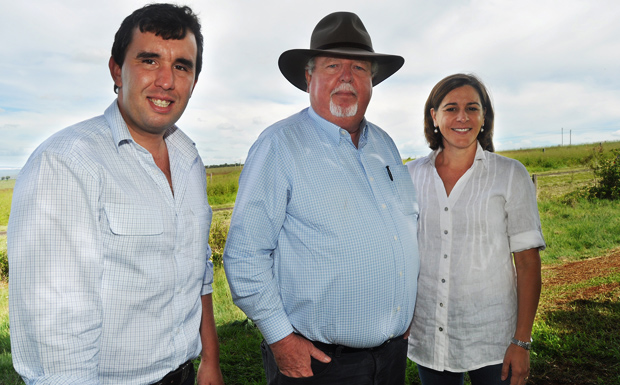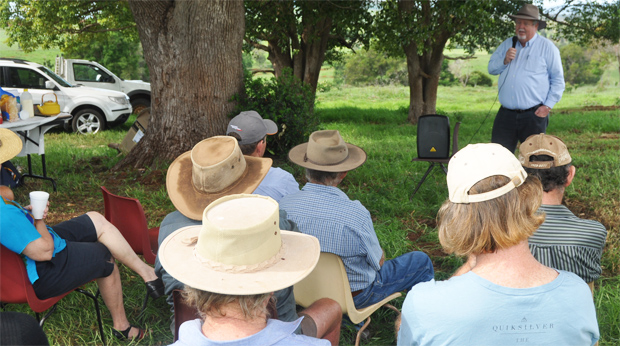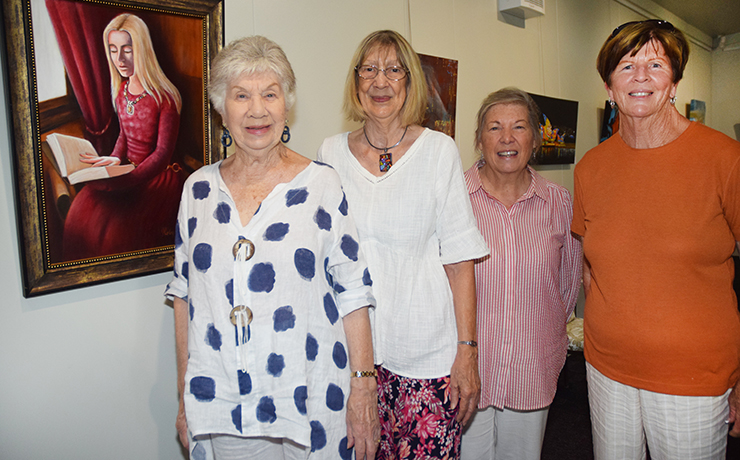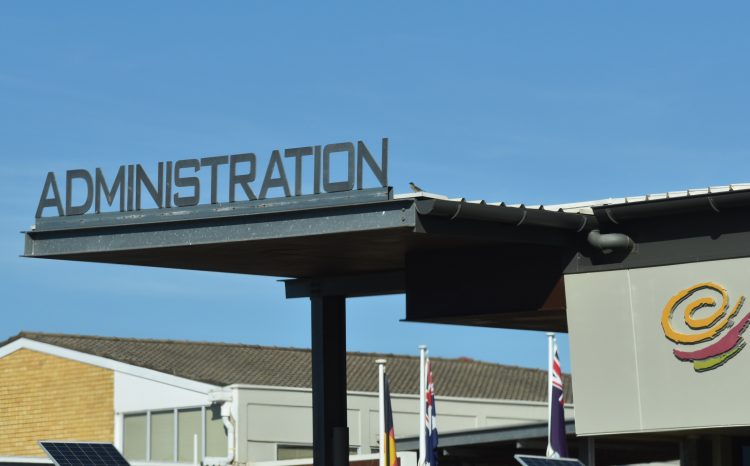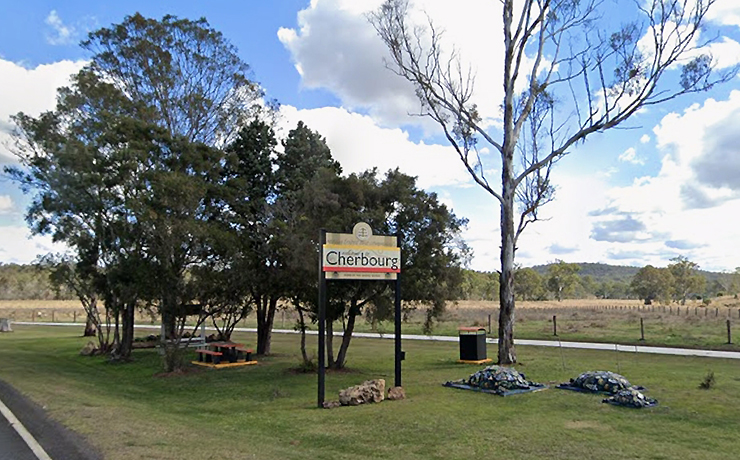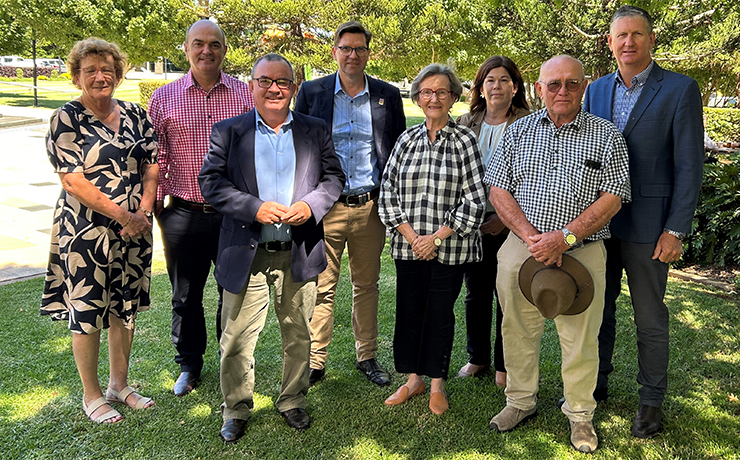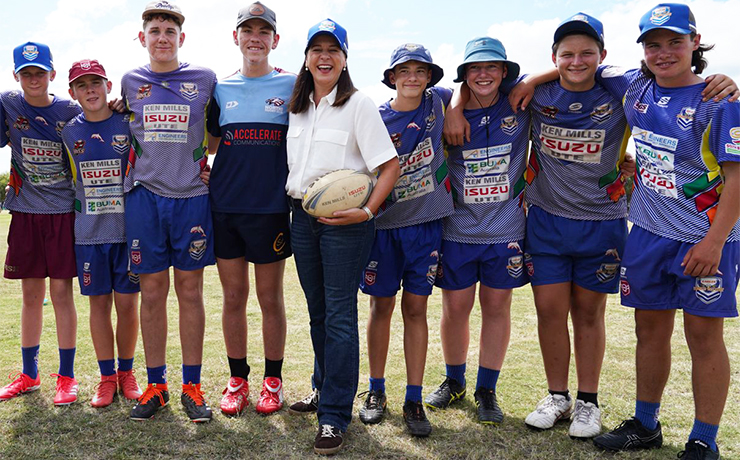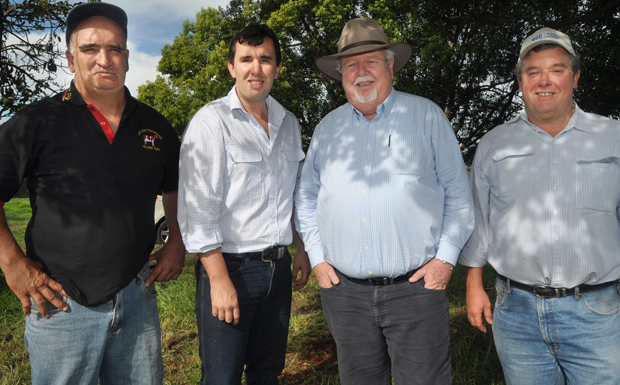
April 29, 2014
South Burnett dairy farmers angry about the state of their industry – and the impact of Coles and Woolworths on their livelihoods – found a sympathetic ear on Saturday from Queensland Senator Barry O’Sullivan.
Senator O’Sullivan, who only recently took up a seat in the Senate, met with the farmers at Gary and Brian Tessmann’s property “Hillside” at Coolabunia.
He said he had been a politician “for only 20 minutes” – he was appointed by Parliament on February 11 to fill a vacancy caused by the resignation of Barnaby Joyce – so he could still admit the perception Federal and State politicians can “fix all your problems” was not right.
Queensland Dairyfarmers’ Organisation president Brian Tessmann quizzed Senator O’Sullivan on his position on the “market failure” in Queensland for drinking milk which started the day Coles started selling milk for $1 /litre (Australia Day 2011).
Senator O’Sullivan said the concentration of the market, ie two retailers buying 80 per cent of the product, could not be described as a “free market”.
“I declare in my view there is no free market for milk in Queensland,” he said.
But he said the $1 / litre move had been a brilliant marketing strategy by the supermarkets.
No matter what the store’s layout, milk – a fundamental staple – was always placed at the furthest corner from the entry point, forcing customers to walk through the store and be tempted to buy other goods.
“The other partial motivation is that they’ll be happy the day that branded milk can’t compete with them and they are only selling generic milk,” Senator O’Sullivan said.
And milk wasn’t the only commodity which didn’t have a “free market”.
There was “not a single thing on the supermarket shelves” including meat and vegetables, which were not adversely affected by what Coles and Woolworths wanted.
Senator O’Sullivan gave the example of Queensland banana growers dropping perfectly sound fruit to the ground because they were too big to pass the supermarkets’ “lunchbox” requirements.
“And I don’t think we have truly free markets for beef in the saleyards, either. It’s not due to Coles and Woolworths but is to do with the concentration of processors,” he said.
Mr Tessmann suggested the supermarkets’ voluntary Code of Conduct (264kb PDF) introduced last year to regulate standards of business conduct in the food and grocery supply chain should become mandatory.
Senator O’Sullivan agreed saying a “voluntary code” was “almost an oxymoron”.
“I believe we need to come to a mandatory code and we need to give it some teeth,” he said.
Senator O’Sullivan said the only place where farmers could turn to get relief was the Australian Competition and Consumer Commission (ACCC).
However at the moment, the onus would be on them to prove “unconscionable conduct”, funding their own case against the supermarket giants.
“Coca-Cola Amatil tried to do just this but eventually pulled out because of the costs involved,” he said.
However if an “effects test” was applied instead – the legal notion of “res ipsa” (ie “the thing speaks for itself”) – there would be a transfer of onus from the farmers to Coles and Woolworths which would be forced to defend their positions.
Senator O’Sullivan warned “it takes an awful long time to get anything done” in Canberra.
“I am not going to tell you that when Parliament resumes we will get ‘effects testing’ through,” he said.
However, he was trying to get together a coalition of MPs and Senators with rural constituencies to effect change.
“Of the 225 members of Parliament, there are less than 40 across the country who wake up and think about the agricultural sector,” he said.
“There is a big load to lift with just a few people.”
He urged everyone to “keep their feet on the pedal”, work with their producer groups and write letters to their MPs.
Senator O’Sullivan said another problem faced by dairy farmers was the fact milk processors were not necessarily on their side.
“I’d bet London to a brick that processors think about themselves before they think about you,” he said.
He said until dairy farmers had “market options”, Coles and Woolworths had “all but nationalised dairy farms”.
Cr Damien Tessmann asked Senator O’Sullivan whether some sort of “collective bargaining” was an option for dairy farmers.
He replied that farmers sometimes had trouble keeping a united front if one could see a marketing opportunity opening up, however a “war council” of 10 of the most aggressive agricultural sectors could challenge the supermarkets.
Senator O’Sullivan said he was also concerned about foreign ownership of agricultural processing.
He said foreign-owned processors exporting to wholly owned subsidiaries overseas would be “entering figures” at the docks which would ensure they paid less tax.
He believed profits were leaving the country, particularly with sugar and beef.
“If there could be more profit in the line, some of that should come back to the farm gate,” he said.
He said farmers had also discussed the effects of Free Trade Agreements with him. He agreed the results for dairy and sugar had been disappointing.
An FTA with China would be significant but “they will be putting the heel of their boots into our adam’s apple and it’s going to be a tough fight for our people at the table”.
Despite all this, Senator O’Sullivan was optimistic about the future, saying he believed Australian agricultural sectors showed great promise over the next 20, 30 or 40 years due to the emerging middle class in Indonesia and China.
“If every one of them had just a thimble full of milk more and a mouthful of meat, it would be more than we could supply,” he said.
